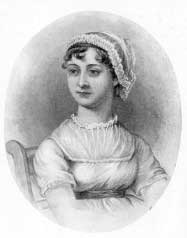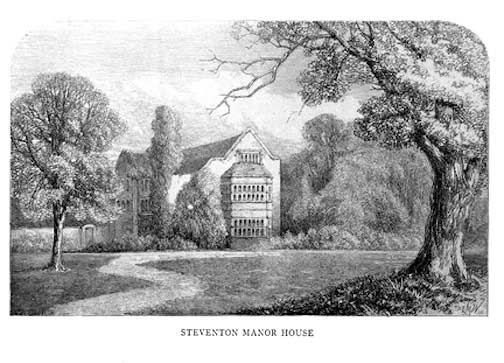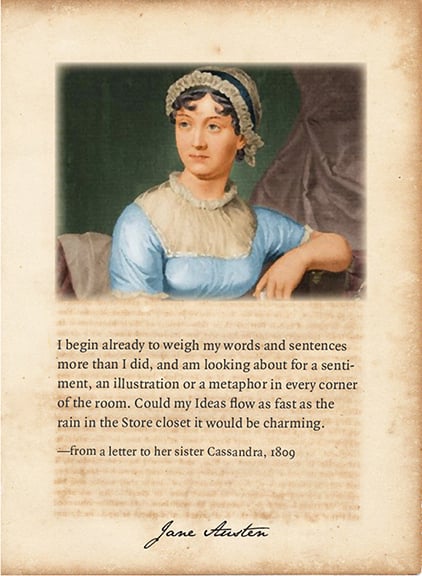Jane Austen’s Childhood and Glimpses of Her as a Young Woman
By Sarah Fanny Malden | On April 17, 2022 | Comments (0)

Jane Austen by Sarah Fanny Malden (1889) offers an excellent 19th-century view of Jane Austen’s works, along with a handful of chapters on the life of this beloved British author. This excerpt, featuring one such chapter, offers glimpses of Jane Austen’s childhood and what she engaged with as a young woman.
Born in Steventon, Hampshire (England), Jane (1775 – 1817) was part of a convivial middle-class family consisting of five brothers and her sister Cassandra, with whom she was very close. Her father was an esteemed rector. Jane spent the first twenty-five years of her life in Steventon, after which the family moved to Bath.
Mrs. Malden said of her sources, “The writer wishes to express her obligations to Lord Brabourne and Mr. C. Austen Leigh for their kind permission to make use of the Memoir and Letters of their gifted relative, which have been her principal authorities for this work.”
The 1889 publication of Malden’s Jane Austen was part of an Eminent Women series published by W.H. Allen & Co., London. The following excerpt is in the public domain:
The society at Steventon
The society immediately around Steventon when Jane Austen was growing up was neither above nor below the average of country society seventy miles from London.
It was not unusual for a country clergyman to find himself the only educated gentleman within a radius of some miles round his parsonage. But the dense ignorance of country gentlemen a hundred years ago is a thing of the past, and it could scarcely happen to any clergyman now to be asked, as Mr. Austen was once by a wealthy squire, “You know all about these things. Do tell us. Is Paris in France, or France in Paris? for my wife has been disputing with me about it.”
The Austens were not, however, dependent entirely on neighbors of this class for their social life, and whether, like Mrs. Bennet, they dined with four-and-twenty families or not, they certainly managed to have a good deal of pleasant society.
By birth and position the Austens were entitled to mix with the best society of their county, and though not rich, their means were sufficient to enable them to associate with the best families in the neighborhood.
Country visits were more of a business then than now; wet weather and bad roads and dark nights made more obstacles to social intercourse than we realize in these days; but a houseful of merry, cultivated young people, presided over by genial parents, is sure to be popular with its neighbors, and Jane Austen had no lack of society when she was growing up.
She was one of a most attractive family party, for they were all warmly attached to each other, full of the small jokes and bright sayings that enliven family life, and blessed with plenty of brains and cultivation, besides the sweet sunny temper that makes everyday life so easy.
. . . . . . . . .

A drawing of Jane by her sister Cassandra
. . . . . . . . . .
Jane’s attachment to her sister, Cassandra
Steventon Rectory in Jane Austen’s girlhood was as cheerful and happy a home as any girl need have desired, and she remembered it affectionately throughout her life, unconscious how much of its sunshine she herself had produced, for in her eyes its brightness was mainly owing to her sister, Cassandra.
It was natural that two sisters coming together at the end of a line of brothers should draw much together, and from her earliest childhood Jane’s devotion to her elder sister was almost passionate in its intensity.
As a little child she pined so miserably when Cassandra began going to school without her, that she was sent also, though too young for school life; but, as Mrs. Austen observed at the time, “If Cassandra were going to have her head cut off, Jane would insist on sharing her fate;” and this childish devotion only increased with riper years.
From beginning to end Jane never wrote a story that was not related first to Cassandra and discussed with her; she literally shared every thought and feeling with her sister, and the two pleasant volumes of letters which Lord Brabourne has published show us how the intense attachment between the two sisters never waned throughout their lives.
All her warmth of heart and devotion to her family shine out in them, as well as her quick perception of character; and they sparkle throughout with quiet fun, and with humor, which is never ill-natured, while from first to last there is not a line written for effect, nor an atom of egotism or self-consciousness.
It is characteristic both of Jane’s self-abnegation and of her complete faith in her sister that, even after she was a successful authoress, she always gave Cassandra’s opinion first to anyone consulting her on literary matters, and if it differed from her own, she mentioned the fact almost apologetically, and merely as if she felt bound to do so.
If she did not actually pine for her sister’s presence after she was grown up, she certainly missed her, even in a short time, far more than most sisters, however affectionate, would do.
At twenty she is eager to give up a ball to which she had been looking forward, merely that Cassandra may return from a visit two days earlier than she otherwise could, and writes, “I shall be extremely impatient to hear from you again, that I may know when you are to return.”
At another time she reproaches her for staying away longer than she need have done, and entreats her to write oftener while away, declaring, “I am sure nobody can desire your letters as much as I do,” while every letter she receives from Cassandra is commented on with the same lover-like ardor, and received with the same delight, long after both the sisters had passed the romantic stage of girlhood.
“Excellent sweetness of you to send me such a nice long letter,” writes Jane, in 1813, when she was eight and thirty years old; and though doubtless letters were greater treasures then than now, it must be remembered that these and similar expressions are from a woman who was usually anything but “gushing” or “sentimental” in her language.
Wherever the sisters were they always shared their bedroom, and if Jane’s feeling was the clinging devotion of a younger to an elder sister, Cassandra certainly returned it with an intense sympathy and affection that never diminished in life or in death.
The sisters were educated together chiefly at home. Mr. Austen taught his sons in great part himself, and was well fitted to do so, but the higher education for women had not then been discovered, and the Austen girls were not better instructed than other young ladies of their day.
. . . . . . . . .
 . . . . . . . . . .
. . . . . . . . . .
Other talents
Jane’s special gift was skill and dexterity with her fingers; she was a first-rate needlewoman and delighted in needlework; she excelled also in any game or occupation that required neat-fingeredness; but she was no artist, and not a great musician, though far from a bad one.
Like Elizabeth Bennet, “her performance was pleasing, though by no means capital.” She was an excellent French scholar, and a fair Italian one; German was in her day quite an exceptional acquirement for ladies; and as to what was then thought of the dead languages for them, all readers of Hannah More must remember her bashful heroine who put the cream into the teapot and the sugar into the milk-jug on it being discovered that she read Latin with her father!
. . . . . . . . .

You may also enjoy: Jane Austen’s Literary Ambitions
. . . . . . . . . . .
Early literary influences
Jane Austen risked no such overwhelming discovery, but she was well acquainted with the standard writers of her time and had a fair knowledge of miscellaneous literature. Crabbe, Cowper, Johnson, and Scott were her favorite poets, though, rather oddly, she set Crabbe highest; and it was a standing joke in the family that she would have been delighted to become Mrs. Crabbe if she had ever been personally acquainted with the poet.
Old novels were her delight, and the influence of Richardson and Fanny Burney may be traced in some of her early writings. I have always thought that her criticism on the Spectator in Northanger Abbey proves that she could have known very little of Steele and Addison’s masterpieces; but tastes differ, and she may have been unlucky in her selections.
She always took pleasure in calling herself “ignorant and uninformed,” and in declaring that she hated solid reading; but her letters continually make mention of new books which she is reading, and there was a constant stream of literature setting through the rectory at Steventon, in which Jane shared quite as fully as any of the others.
An early and avid writer
The delight and pursuit of her life, however, from very early days, was writing, and she seems to have been permitted to indulge in this pleasure with very little restraint; all the more, perhaps, that no amount of scribbling ever succeeded in spoiling her excellent handwriting.
After she grew up to womanhood she regretted not having read more and written less before she was sixteen and urged one of her nieces not to follow her example in that respect; but there must have been many wet or solitary days in the quiet rectory life which would have been very dull for the child without such a resource, and posterity may rejoice that no one hindered Jane Austen’s inclination for writing.
How soon she began to produce finished stories is not certain, but from a very early age her writings were a continual amusement and interest to the home circle, where they were criticized and admired with no idea as to what they might lead.
Most young authors try their hands at dramatic writing some time or other, and Jane passed through this stage of composition when she was about twelve years old, though she never seems to have attempted it later in life.
Private family theatricals
It was not a style which could have suited her, but at the time she tried it the young Austens had taken a craze for private theatricals, and Jane’s plays are thus easily accounted for. [According to James Edward Austen Leigh, a nephew who later wrote a memoir of his famed aunt, Jane was between thirteen and sixteen at the time of this family pursuit.]
The corps dramatique consisted of the brothers and sisters and a cousin, who had become one of them under pathetically romantic circumstances. She was a niece of Mr. Austen’s, had been educated in Paris, and married to a French nobleman, the Count de la Feuillade. He was guillotined in the Revolution, and she, with great difficulty, made her way to England, where she found a home in the already well-filled rectory at Steventon.
She was clever and accomplished, rather un-English in her ways and tastes, and very ready to help in the theatricals, which, perhaps, would not have existed but for her. There was no theatre but the dining-room or a barn, and both actors and audience must have been limited in number; but plays were got up in which Mme. de Feuillade was the principal actress.
James Austen wrote brilliant prologues and epilogues when they were wanted, and Jane Austen looked on and laid in materials for the immortal theatricals of the Bertram family.
Space must have made it impossible for a Mr. Yates, a Mr. Rushworth, or the Crawfords to be among the Steventon actors; but there may have been a very sufficient spice of lovemaking throughout the business, for Mme. de Feuillade afterwards married Henry Austen, Jane’s third brother. It is probable that there were enough “passages” between them during the theatricals to interest a girl of Jane’s age keenly.
Meanwhile, something—perhaps the absurdly transparent mysteries in which some old comedies abound—suggested to her a little jeu d’esprit, which, slight as it is, shows her keen sense of fun and her close observation, for she has copied the style and manner of an old play very closely, even in the dedication.
Leave a Reply